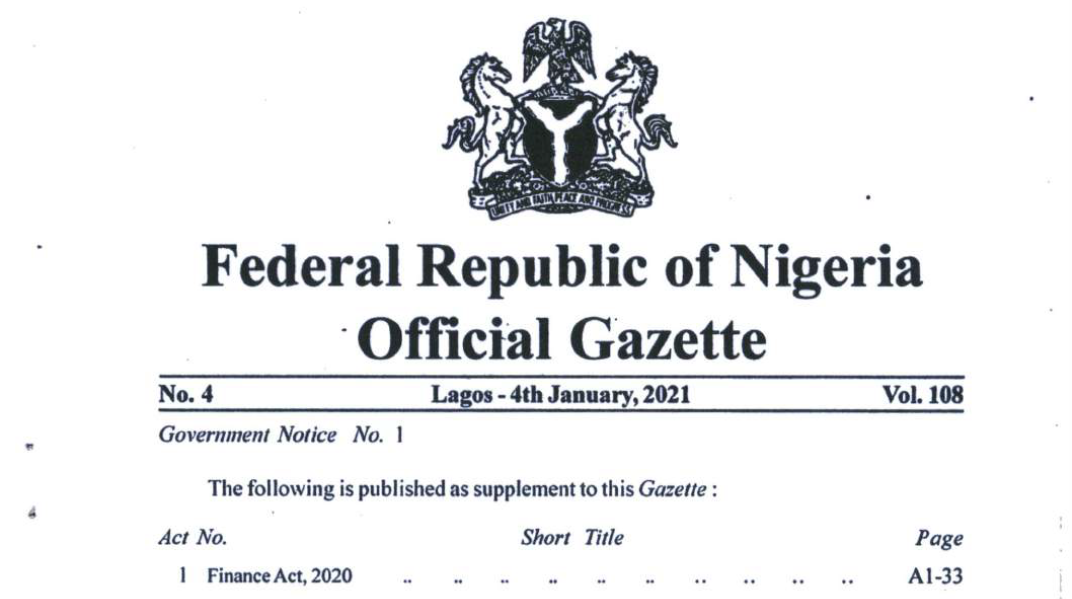- 6 Modile Way, Surulere, Lagos
- (+234) 813 601 5531
The Finance Act 2020
Over 80 amendments to the existing tax and regulatory legislations in Nigeria as the Finance Act 2020 was signed into law by President Muhammadu Buhari on Thursday 31st January 2020 being the date of commencement as was published in the Gazette effective January 1, 2021.
This is an Act to amend the Capital Gains Tax Act, Cap. C1, Companies Income Tax Act, Cap. C21, Personal Income Tax Act, Cap. P8, Customs and Excise Tariff, Etc. (Consolidated) Act, Cap. C49, Value Added Tax Act, Cap. V1, Nigeria Export Processing Zones Act, Cap. N107, Oil and Gas Export Free Zone Act, Cap. O5, Industrial Development (Income Tax Relief) Act, Cap. I17, Stamp Duties Act, Cap. S8, Laws of The Federation of Nigeria, 2004; Tertiary Education Trust Fund (Establishment) Act No. 15, 2011, Federal Inland Revenue Service (Establishment) Act No. 13, 2007, Fiscal Responsibility Act No. 31, 2007, Public Procurement Act No. 14, 2007 and Companies and Allied Matters Act No. 3, 2020; and for Related Matters. Some of the prominent amendments effected by the Act include:

Capital Gains Tax Act (CGTA)
- Filing of Capital Gains Tax not later than 30 June and December 31 of the year in respect of chargeable assets disposed in the periods;
- A maximum of ₦10,000,000.00 as compensation for loss of office shall not be chargeable gains and subject to tax under this Act.
Companies Income Tax Act (CITA)
- Tax payable shall not be less than – (a) 0.5% of the gross premium for non-life insurance business or (b) 0.5% of the gross income for life insurance business and (c) 0.5% of gross turnover less franked investment income for trading businesses. The applicable minimum tax shall be reduced to 0.25% for tax returns prepared and filed, provided that they fall due on any date between 1st January 2020 and 31st December 2021, both days inclusive;
- Donations made by companies in cash or kind to any fund set up by the Federal or any State Government, or to any MDA designated by the Federal Government, in respect of any pandemic, natural disaster or other exigency shall be allowed as deductions. Limited to 10% of assessable profits after deduction of other allowable donations and provided that requisite documentation evidencing the donation and the cost thereof are provided.
Industrial Development (Income Tax Relief) Act (IDA)
- Any small or medium sized company engaged in primary agricultural production shall be granted an initial tax-free periof of four (4) years which may be extended for an additional maximum of two (2) years and cannot be similar tax holiday incentive under any other Act in force in Nigeria.
Personal Income Tax Act (PITA)
- Where an individual carries on a trade or business of professional services furnished to a person resident in Nigeria, the profits therefrom shall be deemed shall be deemed to be derived from and taxable in Nigeria to the extent that the individual has significant economic presence in Nigeria;
- Where an individual permanently ceases to carry on a trade, business, profession or vocation in Nigeria, such individual’s assessable income therefrom shall be the amount of income from the beginning of the accounting period to the date of cessation and the tax thereof shall be payable within three (3) months from the date of cessation.
Customs and Excise Tariff, Etc. (Consolidation) Act (CETA)
The First Schedule to the Act is amended by inserting and replacing, as the case may be, the following duties and levies:
- Duty on Tractors (HS Headings 8701) from 35% to 5%;
- Duty on Motor Vehicles for the transport of more than ten (10) persons (HS Headings 8702) from 35% to 10%;
- Levy on Motor Vehicles for the transport of persons [cars] (HS Headings 8703) from 35% to 5%; and
- Duty for Motor Vehicles for the transport of goods (HS Headings 8704) from 35% to 10%.
Value Added Tax Act (VATA)
- The tax shall be charged and payable on all supplies of goods and services in Nigeria other than those listed in the First Schedule to this Act;
- For the purposes of this Act, goods and services consumed or otherwise utilised in Nigeria are supplied in Nigeria;
- Supply shall be deemed to take place at the time an invoice or receipt is issued by the supplier, or payment of consideration is due to, or received by the supplier in respect of that supply, whichever comes first;
- A non-resident person that makes a taxable supply of goods or services to Nigeria shall register for tax with the Service and obtain Tax Identification Number (TIN).
Stamp Duties Act (SDA)
Section 2 of the Act is amended by substituting for the definition of “stamp”, a new definition:
Stamp means an impressed pattern or mark by means of an engraved or inked die, an adhesive stamp, an electronic stamp or an electronic acknowledgement for denoting any duty or fee, provided that FIRS shall utilise adhesive stamp produced by the Nigeria Postal Service pursuant to its enabling Act.
- There is imposed an Electronic Money Transfer Levy, on electronic receipts or electronic transfer for money deposited in any deposit money bank or financial institution, on any type of account, to be accounted for and expressed to be received by the person to whom the transfer or deposit is made;
- The levy shall be imposed as a singular and one-off charge of ₦50 on electronic receipts or electronic transfers of money in the sum of ₦10,000.00 or more;
- The Minister of Finance shall, subject to the approval of the National Assembly, make regulations for the imposition, administration, collection and remittance of the Levy;
- Notwithstanding any formula that may be prescribed by any other law, the revenue accruing by virtue of the operation of this section, shall, on the basis of derivation, be distributed as follows – (a) 15% to the Federal Government and the Federal Capital Territory, Abuja and (b) 85% to the State Governments.
Companies and Allied Matters Act (CAMA)
- Dividends are special debts due to and recoverable by shareholders within twelve (12) years, and actionable only when declared;
- Dividends that are unclaimed after twelve (12) years should be included in the profits that should be distributed to the other shareholders of the company;
- Dividends of a public limited liability company quoted on the Nigeria Stock Exchange which has remained unclaimed for a period of six (6) years or more from the date of declaring the dividend shall be immediately transferred to the Unclaimed Funds Trust Fund;
- Such unclaimed dividends transferred to the Unclaimed Funds Trust Fund shall be a special debt owed by the Federal Government to the shareholders and shall be available for claim by the shareholder at any time, pursuant to the aforementioned perpetual trust.
Fiscal Responsibility Act (FRA)
- Aggregate expenditure for a financial year may exceed the ceiling imposed by the provisions of subsection (1) if, in the opinion of the President, as may be published in the Official Gazette of the Government of the Federation, or official directives of orders by the President, or through and Appropriation Act, Virement, or other Money Act pursuant to section 59 and or 306 of the Constitution of Federal Republic of Nigeria, 1999 – (a) the Federation or any part thereof, is at war or (b) imminent danger of invasion or (c) breakdown of public order and safety and (d) the occurrence of any pandemic or natural disaster;
- Notwithstanding the provisions of any written law governing the corporation, each corporation shall establish a general reserve fund and shall allocate thereto at the end of each financial year, provided that the cost to revenue ratio of each corporation shall exceed 50% or such other ratio as the Minister, upon the approval of the National Assembly, may approve for that particular corporation by way of order published in the Official Gazette.
Public Procurement Act (PPA)
Subject to the monetary and prior review thresholds for procurements in the Act as may from time to time be determined by the Council, the following shall be the approving authority for the conduct of public procurement:
- In the case of – (a) a government agency, parastatal, or corporation, a parastatal’s Tender’s Board or (b) a ministry or extra-ministerial entity, the Ministerial Tender’s Board or (c) the national assembly, the Parastatals Tenders Board and (d) the judiciary, the Judicial Bodies Tender’s Board and the Courts Tender’s Board;
- In the case of any other public procurement of which the value exceeds the Ministerial Tender’s Board threshold, or any other threshold set by the Bureau and approved by the Council – (a) the Federal Executive Council for the Executive Arm of Government or (b) the National Assembly Tender’s Board for the Legislative Arm of Government and (c) the National Judicial Tender’s Board for the Judicial Arm of Government;
- The chief executive and accounting officer of the procuring entity shall chair the parastatal Tender’s Board, the Permanent Secretary shall chair the Ministerial Tender’s Board, while the President or his representative shall chair the Federal Executive Council;
- The accounting officers of the parastatals under the National Assembly shall chair the Parastatals Tender’s Board, while the Clerk to the National Assembly shall chair the National Assembly Tender’s Board;
- The Secretaries and Chief Registrars shall chair the Boards of the Judicial Bodies respectively, while the Chief Justice of Nigeria, or his representative, shall chair the National Judicial Council Tender’s Board;
- The Secretary to the Government of the Federation or his representative, shall be the Secretary of the Federal Executive Council; the Secretary, Directorate of Procurement, Estate and Works shall serve as Secretary to the National Assembly Tender’s Board, while the Executive Secretary of the National Judicial Council, or his representative, shall be the Secretary of the National Judicial Council Tender’s Board;
- For the Parastatal Tender’s Board and the Ministerial Tender’s Board, the Directors of Procurement shall be the secretaries, and in case of the judiciary, the Secretaries of the Judicial Bodies and the Chief Registrars of the Courts thereof shall be the secretaries.
Establishment of Crisis Intervention Fund and Unclaimed Funds Trust Fund
- There shall be provided out of the Consolidated Revenue Fund and the Special Accounts listed in the First Schedule of this Act upon the coming into operation of this Act the sum of ₦500,000,000,000.00 or such other sums as may be approved by the National Assembly for the establishment of the Crisis Intervention Fund;
- The Crisis Intervention Fund may be utilised for making funds available to meet expenditure as provided in the Annual Appropriation Act to meet any crisis related expenditure or such other exigencies that may arise pursuant to section 12 of the Fiscal Responsibility Act and section 306 of the Constitution of the Federal Republic of Nigeria, 1999;
- Establishment, by way of a trust, as a sub-fund of the Crisis Intervention Fund, an Unclaimed Funds Trust Fund. Any unclaimed dividend of a public company quoted on NSE and any unutilised amounts in a dormant bank account maintained in or by a deposit money bank which has remained unclaimed and unutilised for a period of not less than six (6) years from the date of declaring the dividend or domiciling the funds in a bank account shall be transferred immediately to the Unclaimed Funds Trust Fund;
- The Debt Management Office shall supervise the operations of the fund. The Unclaimed Funds Trust Fund shall be governed by a Governing Council chaired by the Minister of Finance and a Co-Chairperson from the private sector, as may be appointed by the President on the recommendation of the Minister subject to confirmation by the Senate.
In the 24th of December 2020, Clerk to the National Assembly, Ojo O. A., certified, in accordance to with Section 2 (1) of the Acts Authentication Act, Cap. A2, Laws of the Federation of Nigeria 2004 as true copy of the Bill passed by both Houses of the National Assembly.
Recent Post
New Pricing for QuickBooks Online
November 29, 2022
New Pricing for QuickBooks OnlineJune 7, 2021
Introduction of FIRS’ Tax Administration Solution (TAXPRO-MAX)
